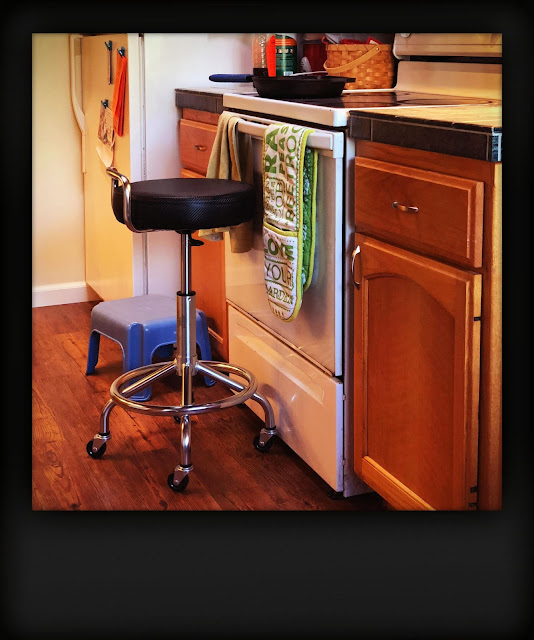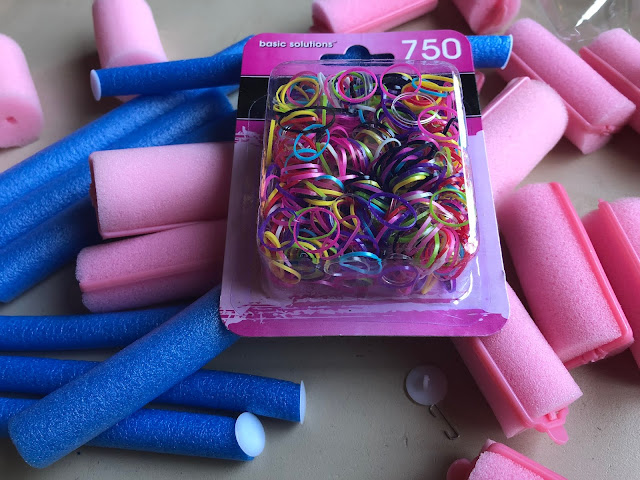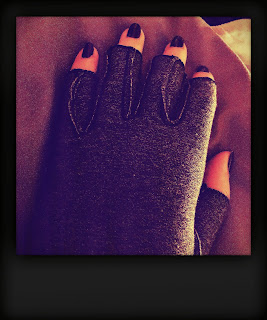Yesterday was a big day. My husband and I went out and bought my first Rollator. I named her "MEG."
Me and Meg hanging out together yesterday.
She's a 16lb light weight, foldable Rollator. I like the fabric back better than a padded bar. The seat is also padded. You can see in the above picture that you can fold it up when walking to give you more leg room. I have long legs, so that's great! She's also plenty wide for my ample backside and very comfortable for sitting in (the main reason I got her.)
MEG
She's VERY easy to push, so at least for now I don't think I have to worry about my arms and hands being over fatigued. I have a physical therapy appointment this Friday. I'll bring her with me to make sure I'm using her in the most ergonomic way.
She's also a beautiful blue/grey color (like a shark) which is also where she gets her name from.
I'm VERY excited to see this new shark movie "Meg."
I ended up just buying one instead of renting. In my area renting one was about $50 a week, but buying was less than $200. If I was pretty sure I was going to need it longer than a week it seemed foolish to flush a quarter of the cost of buying on a rental. Also the ones available for rent were small and not in great shape. It was very helpful for me to go and see them in person and try them out to really know what features and size would work best for my needs. That's the down side to buying online (even though there are some really cute ones online!)
When I got her home I cleaned her off (she was a floor model and caught my eye right when I walked in the door of the medical supply store.) She was pretty, tall and had a cushy bottom... JUST LIKE ME!
My tricked out ride
She didn't come with a basket or under-storage because then the seat couldn't flip up for walking. I could have added one, but I found something even better. One of my favorite bags that's sturdy and made out of seat belts attached perfectly to the front bar. I can even still fold it flat with the bag still attached. I might try and find some thick carabiners or hooks instead of the strap, but for now it works great.
Here's how I knew it was time to get some mobility help:
- I would say "THANK GOD" when I would find a chair I could take a break in while out shopping. Loudly. Every... time...
- I was avoiding stores because of their size.
- I was waiting in the car while my husband went into a store because I was too tired and they wouldn't have anywhere for me to sit and rest if I needed it.
- I would get anxious and upset about a place not having chairs, or when I couldn't find a chair I could sit in.
- I would push myself to walk till I wanted to cry (then I'd cry at home or in my car.)
- I would see a long line and cringe (or leave without buying what I came for.)
- I was changing plans to avoid walking too long.
- I would be happy and grateful to sit on the window sill of a shop (not that my butt fit, but it was better than nothing.)
- I wanted to yell at someone if they got to a public seat before I could (ummm, it's not MY seat! I have to share.)
- I was limiting how much I could buy per shopping trip because I didn't have the stamina to make it in the store for very long without taking a break.
My new kitchen stool arrived yesterday too! My husband already put it together for me and I used it last night while we were cooking dinner. It's fantastic. I feel all ready to go now.
Fantastic kitchen helper
I'm still working out every day and trying to watch what I eat. I'm determined to help myself out as much as I can.
So far my needs/ability looks like this:
- Around the house, small store, around the block or 1 errand - I can walk alone.
- Really big store (like Ikea), multiple errands, standing for a long time (like in a line) - I need Meg.
- Huge store (like mall), big store after exercising or large place (like the zoo, downtown or a big park) - Meg, or I'll need mobile help like renting a scooter or wheelchair.
I am going to talk to my doctor and check with my health insurance company to see if they'll reimburse me for some of the cost of Meg (or better yet, ALL!) But even if they don't it was very worth it.
Just the 1 store we went to after I bought her was a great experience. Before Meg I would have just sat in the car and waited for my husband while he went in alone (or pushed myself and been in pain and miserable.) But this time I went in with him and just sat down when I got tired. He kept looking and I was close by. It was great! I had zero stress too about if the line was going to be long or that they didn't have a chair. It was one of those "I didn't quite realize how bad things had gotten till I had what I really needed" moments.
Reminder to self: Don't let things go. Get the tools you need when you need them.








































